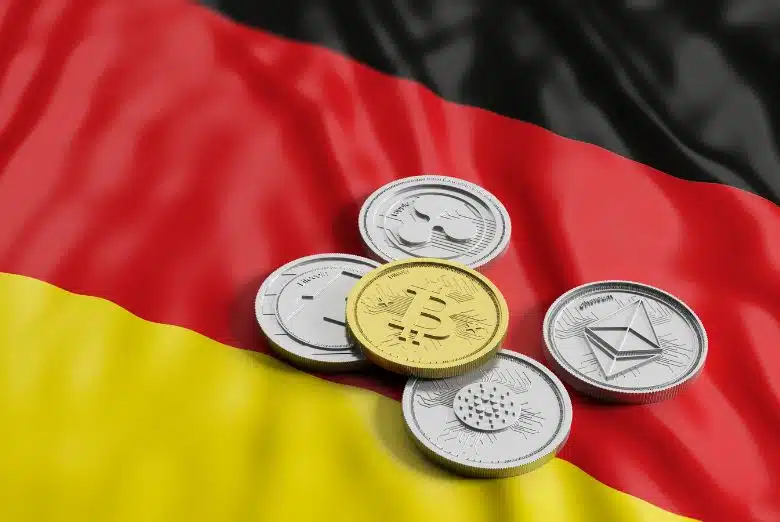An overview of the present condition of the cryptocurrency market in Germany, highlighting its size, trends, and potential for growth

The German crypto market is one of the fastest expanding crypto markets today. Recently, it has become an attractive hub for a slew of investors and traders considering choosing a Germany crypto exchange for investing and trading various digital assets such as Bitcoin, Litecoin, Ethereum, etc. Apart from having a robust, legit framework for crypto trading, Germany has some of the world’s most innovative blockchain technology companies, making it even more attractive for investors looking to get involved in this sector. That said, understanding the significance of the German cryptocurrency market is essential for anyone looking to take advantage of its potential.
If you are interested in trading digital assets in crypto exchange Germany, and are curious to learn the existing market trends, regulatory environment, growth potential, challenges, and risks, this article is the right one for you. So let’s dive in!
Market Size
If you look at the crypto market worldwide, it is easy to see that a staggering variety of cryptocurrencies is available for traders to purchase. However, considering the depreciation of the market in terms of prices, it is difficult to see any sizable return from making a move. A trader does not have to be financially sound to pursue crypto trading and make it profitable. The average trader can make some money by following these strategies. The current size of the German cryptocurrency market is almost identical to that of Japan which currently holds 5th place in total crypto capitalization and trading volume. But as Germany moves up, larger markets like China and USA are forecasted by analysts to come into play as well.
When it comes to the current market size of the German crypto market, it was valued at over one and a half billion in 2020 and is estimated to reach $4.94B by 2030. As reported by Deutsche Börse, the total trading volume for crypto in Frankfurt alone was valued at more than €1bn in 2021.
Currently, the German cryptocurrency market is thinly traded and not very liquid. With a market capitalization of roughly $2 billion, the German cryptocurrency market is tiny compared with the $123 billion market cap of Bitcoin.
Market Trends
Recently, the cryptocurrency market in Germany has emerged as one of the most active in Europe. The growing enthusiasm towards cryptocurrency and blockchain technology has led to high demand for digital currency insiders, promising careers that leave a highly specialized and lucrative industry open for those with an advanced understanding of it.
Here are some of the most popular market trends that traders should know:
- Popularity of specific cryptocurrencies:
The most popular cryptocurrency in Germany has been Bitcoin (BTC), but other digital cryptocurrencies such as Ethereum, Solana, Cardano, and Dogecoin are also gaining ground. It is because Germany is among Europe’s most progressive countries in terms of financial services and cryptocurrency regulations. The German government has also been giving scrupulous attention to all types of existing digital assets traded on the best crypto exchange in Germany. They are explicitly using blockchain technology. Suffice it to say the popularity of specific cryptocurrencies is on the rise.
- The growth of Decentralized Finance (DeFi):
DeFi (Decentralized Finance) is an emerging trend in the German cryptocurrency ecosystem. As reported by many reliable sources, DeFi has the potential to become a global industry worth over $1 trillion by 2024. The growth of decentralized finance in Germany can be attributed to its smart regulation framework and its close connections with blockchain technology and cryptocurrency.
- Impact of global economic events:
The impact of global economic events on the German crypto market is earth-shattering. There are several examples citing the phenomenon. One of the most popular examples is investors from China are now looking toward Germany because they consider this EU country to be one of the most advanced countries when it comes to blockchain technology. Additionally, they value Germany’s friendly stance towards cryptocurrencies, unlike China which has been more hostile with its regulatory framework.
Regulatory Environment
Legal and regulatory framework for cryptocurrencies in Germany
In general, individual states are responsible for determining Legal and regulatory frameworks for cryptocurrencies in Germany, which means numerous versions of laws and regulations vary significantly from one jurisdiction to another. While some countries have taken a pretty restrictive stance on cryptocurrencies, others have been more open-minded about their potential: cryptocurrency is seen as a new financial technology with great innovation potential that could challenge the monopoly of traditional finance firms.
Classification of cryptocurrencies as financial instruments:
On 15 March 2018, the Ministry of Finance of Germany issued a statement on the tax treatment of cryptocurrencies and tokens. According to this statement, cryptocurrencies will be treated as “private money.” Because cryptocurrencies are not legal tender, they are not appropriate to serve as units of accounts or means of payment. Also, the securities law principle that certain assets are not subject to capital gains tax does not apply to them (as they have no investment value). Consequently, the sale of cryptocurrency is considered a barter transaction and is thus liable for income tax under Section Einkommensteuergesetz (EStG).
Licensing requirements for crypto exchanges in Germany:
The licensing requirements for a crypto exchange in Germany are unclear. The German Ministry of Finance has issued a statement according to which a licensing requirement is not applicable to a crypto exchange in Germany for virtual currencies (cryptocurrencies and tokens) as long as these trade exclusively in their own particular electronic currencies, or ‘private money’ which are not convertible in the legal tender.
Potential for Growth
Among the many key factors that have the potential for growth in the German cryptocurrency market include the increased adoption by retail and institutional investor groups. The cryptocurrency market in Germany is expected to grow with an anticipated 24-fold appreciation in value by 2030. This growth can be attributed to the enhanced adoption of these digital assets by retail and institutional investor groups in Germany, who want to diversify their portfolios into crypto assets.
Notwithstanding the potential growth of the crypto market in Germany, one cannot discount certain potential barriers to the growth, like regulatory uncertainty and market volatility. These barriers can easily be attributed to the lack of knowledge of cryptocurrency and blockchain technology by the German masses.
In the wake of the uncertainty that encircles cryptocurrencies and their role in downplaying Germany’s economy, those who cannot afford to lose money in these digital assets due to the high volatility should not invest in them.
Challenges and Risks
Investing in the German cryptocurrency market has some cons and several pros. If you are considering investing in this new, untested market, it is important to understand the key challenges and risks before deciding. These challenges and risks are as follows:
- Volatility of cryptocurrency prices:
As with any market, cryptocurrency is volatile. Therefore, the prices are also volatile, which is easily a critical point of consideration for investors. This risk can be reduced through stop orders and by setting lower price limits. Nevertheless, it is a real risk that your investment may go to zero or lose value quickly in a market where even the top 50 cryptocurrencies can be affected by market volatility.
- Potential for fraud and security breaches:
Potential cryptocurrency fraud and security breaches are more severe than with a standard investment. Cryptocurrency is stored directly in wallets, so it is impossible to reverse fraudulent transactions. These risks can be reduced through careful comparison of all the wallets you are considering, your own research, and investigations into each wallet’s security features.
Conclusion
The German cryptocurrency market has been making strides rapidly in recent times, prompting more and more worldwide investors to invest in it and make the most of its potential. As the demand for digital assets steps up, so does the need for a dependable best crypto exchange Germany for trading purposes. It has enhanced the number of crypto exchanges operating in Germany, facilitating traders to buy and sell cryptocurrencies on their preferred crypto exchanges.
Despite the remarkable development in the crypto market in Germany, some challenges and risks, such as regulatory uncertainty, lack of liquidity, volatility in prices, etc., need to be addressed. Only then the German crypto market can reach its full potential. Irrespective of challenges, the level of hope around the potential of the German crypto market is very high. With enhanced investment from both institutional and retail investors, the odds of continued growth in this sector over the coming years are higher than expected.



